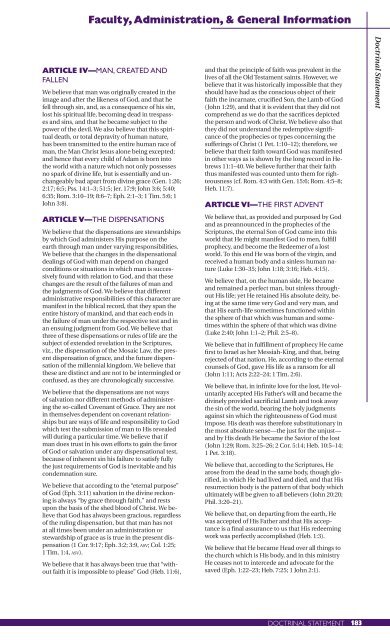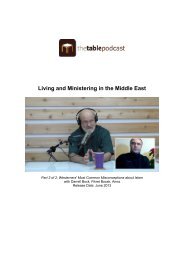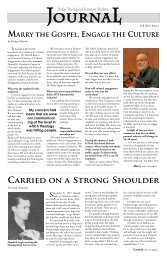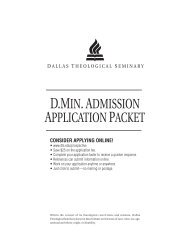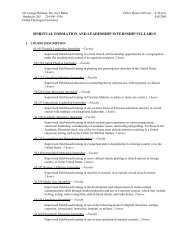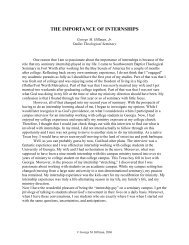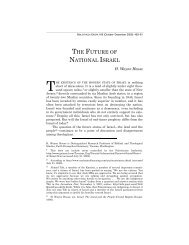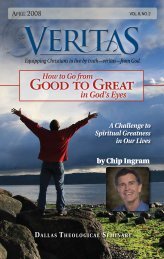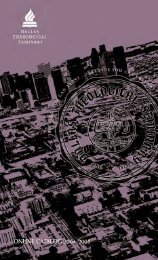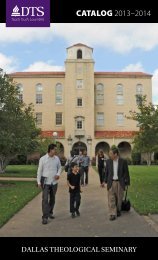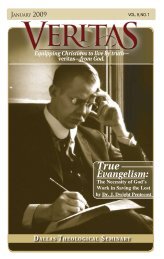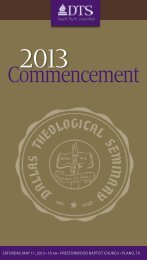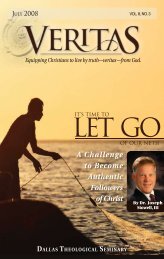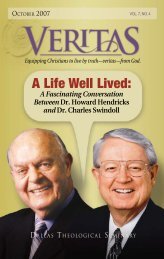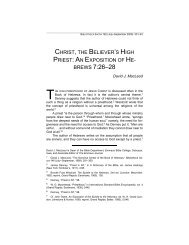Academic Programs - Dallas Theological Seminary
Academic Programs - Dallas Theological Seminary
Academic Programs - Dallas Theological Seminary
You also want an ePaper? Increase the reach of your titles
YUMPU automatically turns print PDFs into web optimized ePapers that Google loves.
Faculty, Administration, & General Information<br />
ARTICLE IV—MAN, CREATED AND<br />
FALLEN<br />
We believe that man was originally created in the<br />
image and after the likeness of God, and that he<br />
fell through sin, and, as a consequence of his sin,<br />
lost his spiritual life, becoming dead in trespasses<br />
and sins, and that he became subject to the<br />
power of the devil. We also believe that this spiritual<br />
death, or total depravity of human nature,<br />
has been transmitted to the entire human race of<br />
man, the Man Christ Jesus alone being excepted;<br />
and hence that every child of Adam is born into<br />
the world with a nature which not only possesses<br />
no spark of divine life, but is essentially and unchangeably<br />
bad apart from divine grace (Gen. 1:26;<br />
2:17; 6:5; Pss. 14:1–3; 51:5; Jer. 17:9; John 3:6; 5:40;<br />
6:35; Rom. 3:10–19; 8:6–7; Eph. 2:1–3; 1 Tim. 5:6; 1<br />
John 3:8).<br />
ARTICLE V—THE DISPENSATIONS<br />
We believe that the dispensations are stewardships<br />
by which God administers His purpose on the<br />
earth through man under varying responsibilities.<br />
We believe that the changes in the dispensational<br />
dealings of God with man depend on changed<br />
conditions or situations in which man is successively<br />
found with relation to God, and that these<br />
changes are the result of the failures of man and<br />
the judgments of God. We believe that different<br />
administrative responsibilities of this character are<br />
manifest in the biblical record, that they span the<br />
entire history of mankind, and that each ends in<br />
the failure of man under the respective test and in<br />
an ensuing judgment from God. We believe that<br />
three of these dispensations or rules of life are the<br />
subject of extended revelation in the Scriptures,<br />
viz., the dispensation of the Mosaic Law, the present<br />
dispensation of grace, and the future dispensation<br />
of the millennial kingdom. We believe that<br />
these are distinct and are not to be intermingled or<br />
confused, as they are chronologically successive.<br />
We believe that the dispensations are not ways<br />
of salvation nor different methods of administering<br />
the so-called Covenant of Grace. They are not<br />
in themselves dependent on covenant relationships<br />
but are ways of life and responsibility to God<br />
which test the submission of man to His revealed<br />
will during a particular time. We believe that if<br />
man does trust in his own efforts to gain the favor<br />
of God or salvation under any dispensational test,<br />
because of inherent sin his failure to satisfy fully<br />
the just requirements of God is inevitable and his<br />
condemnation sure.<br />
We believe that according to the “eternal purpose”<br />
of God (Eph. 3:11) salvation in the divine reckoning<br />
is always “by grace through faith,” and rests<br />
upon the basis of the shed blood of Christ. We believe<br />
that God has always been gracious, regardless<br />
of the ruling dispensation, but that man has not<br />
at all times been under an administration or<br />
stewardship of grace as is true in the present dispensation<br />
(1 Cor. 9:17; Eph. 3:2; 3:9, ASV; Col. 1:25;<br />
1 Tim. 1:4, ASV).<br />
We believe that it has always been true that “without<br />
faith it is impossible to please” God (Heb. 11:6),<br />
and that the principle of faith was prevalent in the<br />
lives of all the Old Testament saints. However, we<br />
believe that it was historically impossible that they<br />
should have had as the conscious object of their<br />
faith the incarnate, crucified Son, the Lamb of God<br />
(John 1:29), and that it is evident that they did not<br />
comprehend as we do that the sacrifices depicted<br />
the person and work of Christ. We believe also that<br />
they did not understand the redemptive significance<br />
of the prophecies or types concerning the<br />
sufferings of Christ (1 Pet. 1:10–12); therefore, we<br />
believe that their faith toward God was manifested<br />
in other ways as is shown by the long record in Hebrews<br />
11:1–40. We believe further that their faith<br />
thus manifested was counted unto them for righteousness<br />
(cf. Rom. 4:3 with Gen. 15:6; Rom. 4:5–8;<br />
Heb. 11:7).<br />
ARTICLE VI—THE FIRST ADVENT<br />
We believe that, as provided and purposed by God<br />
and as preannounced in the prophecies of the<br />
Scriptures, the eternal Son of God came into this<br />
world that He might manifest God to men, fulfill<br />
prophecy, and become the Redeemer of a lost<br />
world. To this end He was born of the virgin, and<br />
received a human body and a sinless human nature<br />
(Luke 1:30–35; John 1:18; 3:16; Heb. 4:15).<br />
We believe that, on the human side, He became<br />
and remained a perfect man, but sinless throughout<br />
His life; yet He retained His absolute deity, being<br />
at the same time very God and very man, and<br />
that His earth-life sometimes functioned within<br />
the sphere of that which was human and sometimes<br />
within the sphere of that which was divine<br />
(Luke 2:40; John 1:1–2; Phil. 2:5–8).<br />
We believe that in fulfillment of prophecy He came<br />
first to Israel as her Messiah-King, and that, being<br />
rejected of that nation, He, according to the eternal<br />
counsels of God, gave His life as a ransom for all<br />
(John 1:11; Acts 2:22–24; 1 Tim. 2:6).<br />
We believe that, in infinite love for the lost, He voluntarily<br />
accepted His Father’s will and became the<br />
divinely provided sacrificial Lamb and took away<br />
the sin of the world, bearing the holy judgments<br />
against sin which the righteousness of God must<br />
impose. His death was therefore substitutionary in<br />
the most absolute sense—the just for the unjust—<br />
and by His death He became the Savior of the lost<br />
(John 1:29; Rom. 3:25–26; 2 Cor. 5:14; Heb. 10:5–14;<br />
1 Pet. 3:18).<br />
We believe that, according to the Scriptures, He<br />
arose from the dead in the same body, though glorified,<br />
in which He had lived and died, and that His<br />
resurrection body is the pattern of that body which<br />
ultimately will be given to all believers (John 20:20;<br />
Phil. 3:20–21).<br />
We believe that, on departing from the earth, He<br />
was accepted of His Father and that His acceptance<br />
is a final assurance to us that His redeeming<br />
work was perfectly accomplished (Heb. 1:3).<br />
We believe that He became Head over all things to<br />
the church which is His body, and in this ministry<br />
He ceases not to intercede and advocate for the<br />
saved (Eph. 1:22–23; Heb. 7:25; 1 John 2:1).<br />
Doctrinal Statement<br />
DOCTRINAL STATEMENT<br />
183


